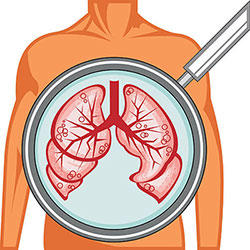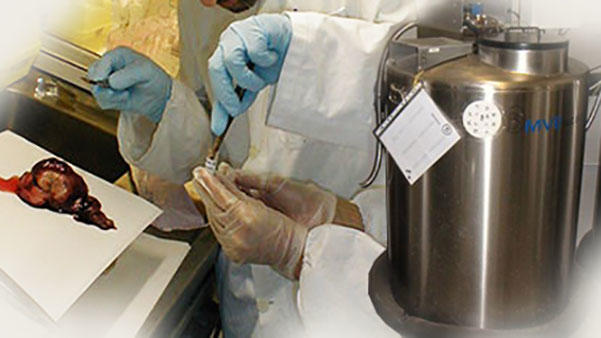Overview
Data from EAGLE have informed descriptive, molecular, clinical, genetic/genomic, and smoking studies, with over 100 publications to date.
Environment And Genetics in Lung cancer Etiology (EAGLE) was developed to investigate the genetic and environmental determinants of lung cancer and smoking persistence using an integrative approach, combining analysis of genetic, environmental, clinical, and behavioral data.
EAGLE provides a rich resource benefiting the wider scientific community. The data have been downloaded by hundreds of investigators and biospecimens have contributed to international consortia and tissue-based studies that have helped to identify many common genetic factors for lung cancer.
The design and approach novel to EAGLE form the basis of new investigations, such as Sherlock-Lung, and the new Connect for Cancer Prevention Study.
See all DCEG research on lung cancer and tobacco/smoking.
Study Team
Lead Investigator
Maria Teresa Landi, M.D., Ph.D., Senior Investigator
Integrative Tumor Epidemiology Branch
Collaborating Organization
Pier Alberto Bertazzi M.D., M.P.H., Project Director (deceased)
EPOCA - Epidemiologia Occupazionale Clinica e Ambientale, University of Milan, Italy
Former Study Team Members
Andrew Bergen, Ph.D.
Neil Caporaso, M.D. (retired)
Melissa Rotunno, Ph.D.
Margaret Tucker, M.D.(retired)
Sholom Wacholder, Ph.D. (deceased)
Background & Purpose
The role of smoking has been well-documented in lung cancer for over 50 years. Less well-understood is why only 15-20 percent of smokers are afflicted with lung cancer and a small proportion of lung cancer occurs in the absence of smoking.
A key goal of the EAGLE Study was to understand the role of inherited variation in smokers with lung cancer.
Building from the success of EAGLE, investigators launched the Sherlock-Lung study to evaluate lung cancer risk in never smokers.
See all DCEG research on lung cancer, tobacco/smoking, and case-control studies.
Study Design
EAGLE was a large, multicenter, population–based molecular epidemiology case-control study of lung cancer with a major biospecimen component conducted in the Lombardy Region of Italy from 2002-2005.
Investigators enrolled over 2,000 incident lung cancer cases, both males and females, ages 35 to 79 years old, with verified lung cancer of any histological type, and over 2,000 healthy population-based controls matched to cases by age, sex, and residence.
Lung cancer cases were enrolled from 13 hospitals; healthy controls were randomly selected from the same residential area as the lung cancer cases.
Extensive epidemiological data were collected through both an interview-based computer-assisted questionnaire and a self-administered questionnaire, including demographic characteristics, detailed smoking history, family history of lung cancer and other cancers, previous lung diseases, medications, diet, alcohol, attempts at quitting smoking, anxiety, depression, personality scores, occupation, reproductive and residential history.
Additional questionnaires were administered to next of kin and siblings of the affected individuals, as needed.
Biospecimens collected included blood (divided into components for storage including serum, plasma, buffy coat, red blood cells, DNA, RNA, whole blood, and blood cards) or, in rare occasions, buccal cell samples; tissue blocks; tissue slides; and fresh tissue (frozen in liquid nitrogen) from operative candidates; and genetic material.
Study Results & Select Publications
Risk Factor Analyses
Early results from EAGLE focused on exposure-based association studies. Investigators conducted a series of descriptive analyses, examining the role of occupational exposures, dietary components, infections, previous lung diseases, hormonal factors, and circulating immune markers in the etiology of lung cancer. They found increased lung cancer risk in association with:
- occupations, particularly those involving exposure to asbestos, silica, and nickel-chromium;
- frequent meat intake;
- history of some lung diseases.
These factors may influence chronic inflammation, a known pathway for tumorigenesis.
In contrast, quercetin-rich foods (fruits and vegetables), history of pneumonia or mood disorders, low alcohol intake, and endogenous hormones during premenopausal years were inversely associated with lung cancer risk. The investigators also analyzed the influence of air pollution on lung cancer risk, using data from detailed exposure maps covering the entire region.
Sub-type Specific Analyses
A genome-wide methylation analysis found that methylation patterns, and the inherited variations that influence them, strongly differentiated risk for various subtypes of non-small cell carcinoma.
Another genetic analysis provided the first evidence of inherited susceptibility to a distinct lung cancer subtype. In pooled data from 33,000 participants from EAGLE and other cohort studies, a single nucleotide polymorphism in the TERT region was associated with risk of adenocarcinoma but not squamous cell carcinoma or small cell lung cancer.
Similarly, a pathway analysis of inflammation-related genes showed that the RAD52 region was distinctly associated with squamous cell carcinoma risk. This finding was validated in three other study populations.
EAGLE investigators identified rare deleterious variants associated with lung cancer risk using a large whole exome sequencing study.
Studies of Lung Cancer Outcomes and Prognosis
Results of an analysis of lung cancer prognosis described patterns of indicators for recurrence, metastases, and survival that may one day inform the treatment of patients.
The researchers estimated risks of metastasis and recurrence for surgically treated (stage IA-IIIA) and non-surgically treated patients (stage IIIB-IV). They observed that regardless of cancer stage, grade, or type of lung cancer, patients in the study were more likely to have distant metastasis than local recurrence. They noted that their estimates are likely applicable to the general population.
EAGLE investigators explored biopsy techniques to determine if samples collected from multiple regions of the same tumor performed better than single location samples to determine tumor heterogeneity, and clonal evolution in lung cancer using their collection of tissue samples.
They also studied the clinical implications of inter- and intratumor heterogeneity of immune cell markers.
Smoking Behaviors and Lung Cancer Risk
A novel feature of EAGLE was the incorporation of behavioral data such as nicotine dependency, which made possible a series of studies of nicotine dependence, including time to first cigarette. People who are highly addicted to nicotine—those who smoke their first cigarette within five minutes after awakening—are at higher risk of developing lung cancer than those who wait for an hour or more to smoke. Researchers found this simple measure of nicotine dependency improved lung cancer risk prediction beyond standard smoking measures, such as cigarettes per day, age, gender, history of chronic obstructive pulmonary disease and other lung cancer risk factors.
Data Sharing
We are accepting proposals for new projects. Epidemiologists or others interested in collaboration should contact Dr. Landi for more information.
New proposals are to be accompanied by a one-two page document that outlines: hypothesis and study questions (aims), all proposed collaborators and their related institutions, justification/suitability to the EAGLE study, analyses proposed, variables requested, timeline, source of funding, and key references. Documentation of ethical approval or waiver from the local institution of the requester shall be provided before a final dataset is released.




